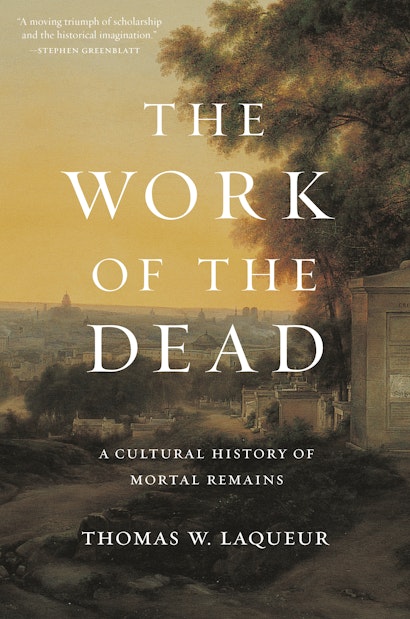"Hardly a sentence in Laqueur's long book is wasted."—John Gray, New York Review of Books
"[A] sprawling meditation on mortal remains. . . . Laqueur offers an intricate historical narrative about the place the dead occupy in our lives. . . . The Work of the Dead is a methodologically bracing book."—Thomas Meaney, London Review of Books
"Laqueur effectively shows that remains of the dead matter long after they decompose . . . [and his] engaging writing style enlivens this somber subject."—Library Journal
"The product of prodigious research and a subtle and sophisticated knowledge of history, anthropology, and philosophy, The Work of the Dead is as magnificent—and mindboggling—as it is monumental."—Glenn C. Altschuler, Huffington Post
"Enormously detailed and absorbing. . . . [A] remarkably supple and fascinating study, providing as it were the sociological and forensic underpinning of every ghost story ever told. . . . The Work of the Dead [is] both provocative and, you should pardon the term, lively (and readers should be sure not to miss the wonderfully argumentative end notes). It'll change the way you look at being dead and buried."—Steve Donoghue, Open Letters Monthly
"Laqueur's book is a monumental undertaking, teeming with so many absorbing anecdotes and so much vivid information that it can be read either compulsively or for an hour a day, just to keep in sight of the nub of our fears and the often romantic absurdity of our hopes and superstitions."—Gregory Day, Sydney Morning Herald
"This massive, mesmerizing work contains much that's worth pondering."—Publishers Weekly
"Monumentally learned. . . . Laqueur's mastery of this history, and his limpid prose, make this a deeply engaging text."—Deborah Lutz, Times Higher Education
"The Work of the Dead is an enormous, erudite, sprawling, garrulous, exhausting and brilliant piece of work. And it never forgets that thread of 'intuition and feeling'."—Economist
"A major work of scholarship on an undiscovered country, the land of the dead, which, as it turns out, has had major implications for the living. Laqueur's book. . . aims to show that our care for the dead (‘materially and imaginatively') marks ‘the sign of our emergence from the order of nature into culture.'"—Jonathan Sturgeon, Flavorwire
"[The Work of the Dead] is, quite simply, an extraordinary book. . . . [I]n short, this is the work of a great historian doing what we all do, only better: reckoning with death as we bide time until our own."—Darrin M. McMahon, Literary Review
"Magnificent. . . . Dazzling in its scope, expertly researched and crafted,The Work of the Dead shows us what is important about our humanity and longings. It is also a page-turner and a terrific read."—Sharon R. Kaufman, Los Angeles Review of Books
"After being asked what he would like to have done with his body after he died, the Greek philosopher Diogenes replied that he wanted it thrown out for animals to devour. Thousands of years later, his answer can still shock. Thomas Laqueur explains why in his sweeping history of the way humans have grappled with death—an abstract terror made concrete by the bodies that remain when the dead have passed on. Combining anthropological reflections on the cultural functions of the dead with historical investigations of the shifting ways their bodies have been treated, Laqueur uses the stubborn resistance to Diogenes' provocation to explore the world the dead left behind."—Tim Shenk, Dissent
"Poetically, powerfully sweeping across human history, Laqueur explores what the rituals of caring for the departed reveal about the living. Their story is ours; their absence shapes art and architecture, communities and civilizations. In every era and every culture, Laqueur finds the dead body imbued with meaning."—Swarthmore Bulletin
"Laqueur's venerable research all leads to one principal concluding thought, which is that while we can know logically that the human corpse is unrelated to the personality it once held, it is the most intimately connected material thing that is left of a life."—Juniper Quin, SevenPonds
"Do the dead matter? This is the central question in this meticulously researched, all-encompassing exploration of our mortal remains. . . . In this intimate and often very personal reflection, Laqueur asserts that we need our rituals to serve the dead to smooth over the rent that is caused in the passing of those we love. . . This thought-provoking tome, erudite and finely written, seemingly encapsulates all past uttering on the dead in our fleetingly short lives."—Julie Peakman, History Today
"[An] invariably fascinating treatment of a morbid subject."—Choice
"One meticulously argumented stroll through time and beliefs, highly attractive in its depth and far-reachingness. . . . Laqueur has succeeded where many others had not: he opened for us a tiny window on the concept of death and dying without violating historiographic objectiveness or trying to impose judgements or values."—Amir Muzur, European Journal of Bioethics
"We look at the masterpiece with awe: How is it possible to do so much, to say so much about the dead in so many societies over such a broad sweep of time, even in a book as capacious as this?"—-Annette Becker, American Historical Review
"The Work of the Dead is packed with information, surprises, unaccustomed lore and learning, and Laqueur shows throughout a sturdy curiosity, as he digs unflinchingly around and into his chosen topic."—Marina Warner, London Review of Books
"Monumental."—New English Landscape
"Laqueur brings prodigious compassion, erudition, and independence of thought to his task: every page is instructive, whether he is discussing the pollution caused by crematoria, the problems of pauper burials, the belief that undressing a corpse and opening windows makes it easier for the soul to leave the body, or just the listing of the names of the dead."—David Ganz, The Review of Politics
"Historians of death in particular should thus keep this book at hand. Richly illustrated, detailed and accessible, The Work of the Dead is infused with approximately 35 years of travel, conversations, discoveries in archives and personal experience. It invites all readers to think further about the role that the dead play in the way that we live."—Martin Robert, Mortality
"This book is a monumental Magnum Opus covering the cultural history of how we are treated mortal remains. . . . This is surely the definitive treatment of the subject, a landmark and highly readable work."—David Lorimer, Paradigm Explorer
"This passionate and compassionate book is nothing short of a magnum opus. In it one of the most original and daring historians of our time guides the reader on an unexpected journey through churchyards, cemeteries, and crematoriums, challenging common wisdom and offering startling new insights into the meaning of our ways of caring for the dead."—Lynn Hunt, author of Writing History in the Global Era
"Thomas Laqueur's magnificent book is haunted by the ancient Cynic philosopher Diogenes, who wanted his corpse simply thrown over the walls of the city for wild dogs to eat. Why humans do not dispose of the dead in such a way, why we feel compelled as a species to treat our mortal remains with such an astonishing variety of rituals, is the subject of this deeply learned and richly detailed meditation. Eschewing simple explanations, ranging across centuries and cultures, plunging with unflagging energy into vast archives, Laqueur discloses and explores the work that the dead do for the living. The Work of the Dead is like a vast canvas in which the reader can somehow see at the same moment the tiny buttons on a frock coat and the curvature of the earth. The book is a moving triumph of scholarship and the historical imagination."—Stephen Greenblatt, author of The Swerve: How the World Became Modern
"An astonishingly erudite and beautifully written history that is both epic and intimate, The Work of the Dead exhumes subtle and seismic shifts in the vital place that the dead have among the living. Ranging from the earliest burial practices to the modern cemetery and crematorium, Thomas Laqueur reminds us that how we treat the dead is a key to understanding the cultures of the living. Who would have thought the dead could provide so much insight and illumination?"—John Brewer, Caltech
"This is a truly great book—a milestone of scholarship and a joy to read. The brilliance and richness of each chapter are thrilling, and the movement between literary examples, philosophical discussion, and a vast array of historical sources is simply incredible."—Claudio W. Lomnitz, Columbia University
"The Work of the Dead is an enormous, erudite, garrulous, exhausting and brilliant piece of work. And it never forgets that thread of ‘intuition and feeling.' Diogenes will be turning in his grave."—The Economist
"The product of prodigious research and a subtle and sophisticated knowledge of history, anthropology, and philosophy,The Work of the Dead is as magnificent—and mindboggling—as it is monumental."—Glenn Altschuler, Huffington Post


